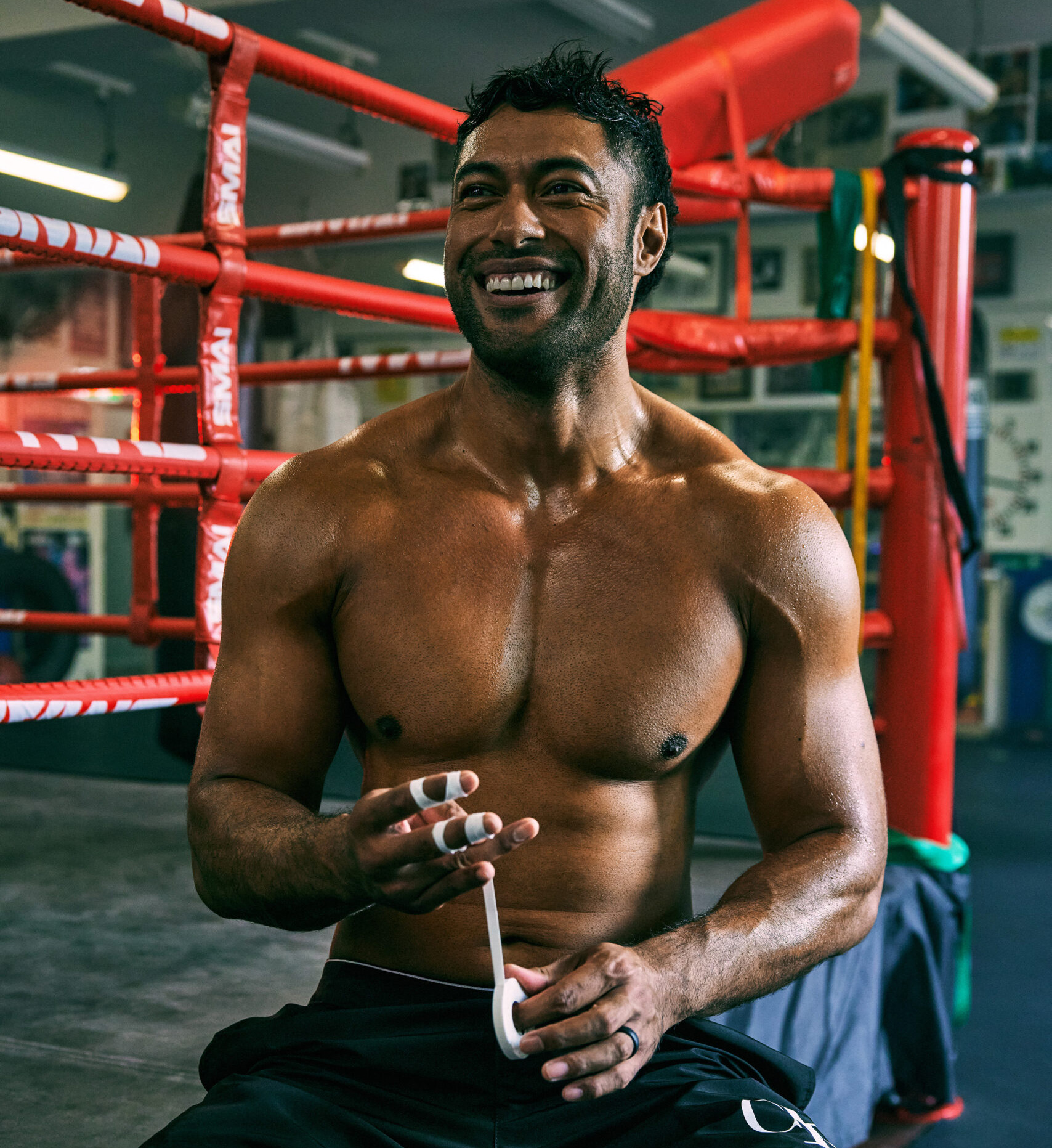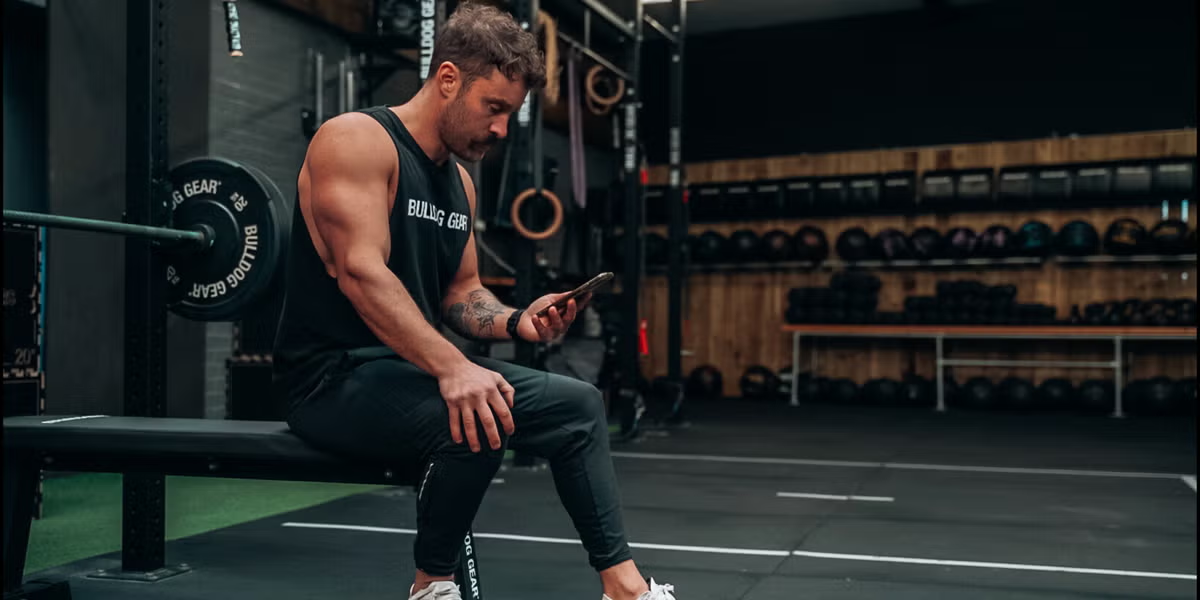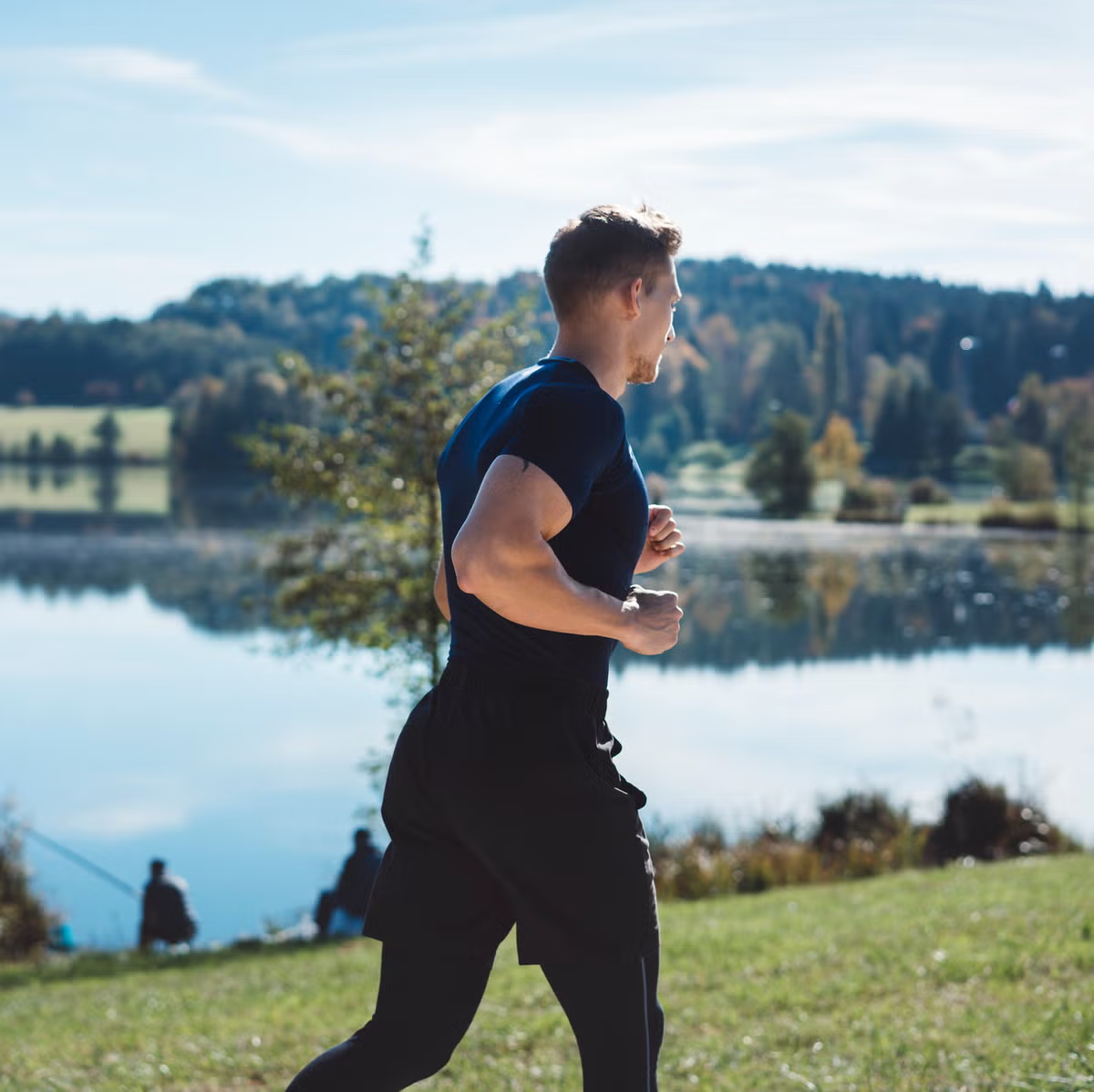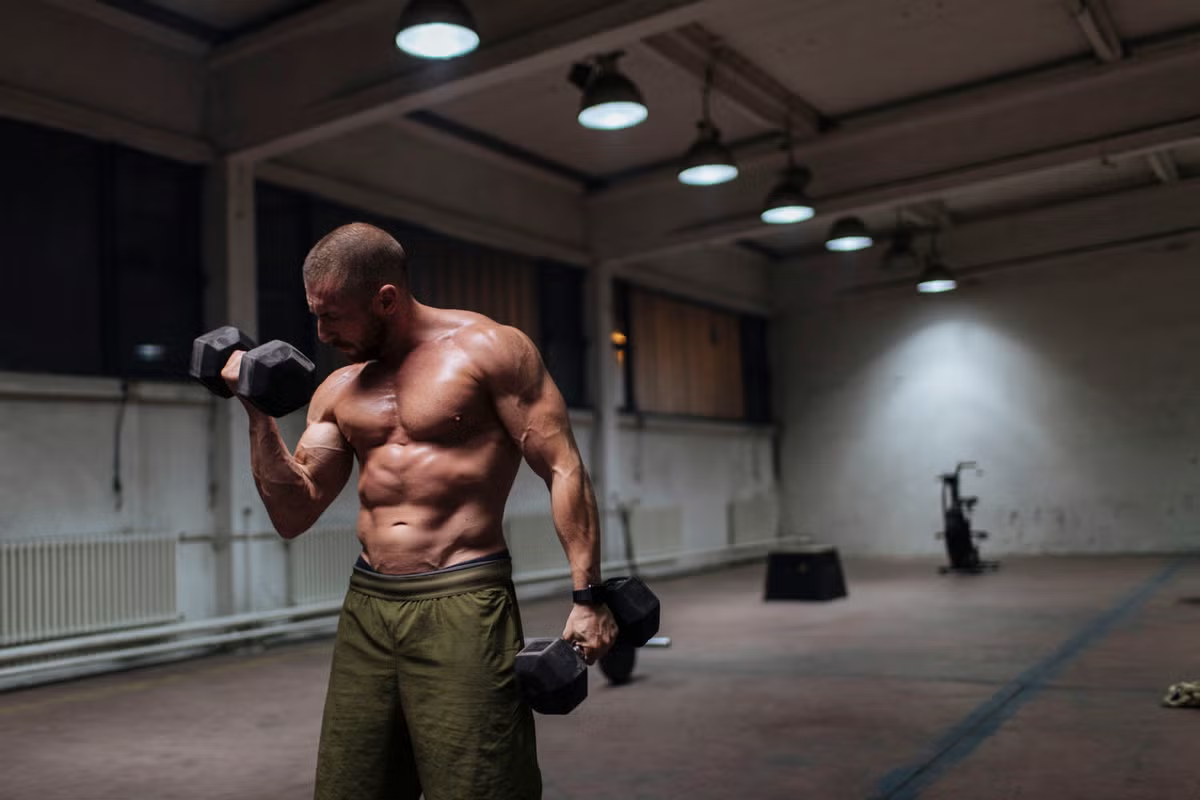BOOM, BOOM, BOOM. There’s a scene in When We Were Kings, the seminal sports documentary about the 1974 title fight between Muhammed Ali and George Foreman, in which Foreman, then heavyweight champion of the world, is hitting the heavy bag.
Each time Foreman sinks one of his meaty fists into the bag, there’s a dull thud as the padded cylinder swings back and the viewer is left to imagine such ferocious force radiating on human flesh.
Writer Norman Mailer, who covered the fight, tells the interviewer: “Foreman hitting the heavy bag is one of the more prodigious sights I’ve seen in my life. Of all the people I’ve seen hitting the heavy bag, including Sonny Liston, no one ever hit it the way Foreman did.”
I’m reminded of the scene as Uli Latukefu, a man of similar build and power to the young Foreman, metes out punishment to a bag at Woolloomooloo PCYC in Sydney’s inner east. Each of Latukefu’s thunderous blows echoes around the gritty old school gym, as the bag swings as if on a pendulum. Cast amid ancient fight posters that are peeling off the walls, it’s if the greats of the sweet science—Tyson, Roy Jones Jnr., Lennox Lewis and Ali himself—are looking on.
When the photographer stops shooting, the 39-year-old father of two breaks to wipe sweat from his brow, his intensity broken by a blinding smile. “When I smile people think, He’s so big but so friendly,” he jokes.
Boxing isn’t Latukefu’s chosen sport. Growing up, he loved rugby. This year he found jiu-jitsu, realising how much he missed “physicality” and how healthy it can be to have your arse handed to you. In 10 months or so, it’s become his obsession. “Physically I’m quite capable of doing things, but you step into an arena, not knowing anything, it’s a whole new skillset and you have to be humble or you will be humbled very quickly,” Latukefu tells me, as we chat later over a lunch of kefta rolls at a pub down the road.
The actor doesn’t mind taking some licks, he says, if it’s in service of growth. “My approach to everything is to be teachable,” he says. “Be teachable, be teachable, be teachable. I don’t care if I get tapped out 50 times. If I’m learning, I’m good because I’ll get there eventually. And having that mindset fits perfectly with jiu-jitsu because the consequences of not having that are immediate.”
It’s hard to picture a 117kg, 198cm colossus being humbled physically but Latukefu was cut down to size, so to speak, in his early days on the mat by a 16-year-old blue belt. “I mean, you go in thinking, He’s not as big as me. He’s not as physically imposing as me,” recalls Latukefu. “So, you have some level of confidence that I’ll be able to manage. And this guy just wrapped his legs around my neck and then had my arm stuck and I just went, This is it! I love this!”
It wasn’t the only time Latukefu would find himself on the receiving end this year. A move to LA would put him in a similar, if wholly metaphorical, chokehold—“It mounted me and had me in a tight, tight squeeze,” he jokes of the City of Angels. It would see him doubt himself, his instincts, why he was pursuing a dream that was hurting the people he loved. Jiu-jitsu would help him there, too, he says, showing him time and again that no matter who you are, there’s always more to learn, that you can endure more than you think you can, and that even when things aren’t going your way, you can turn the tables, flip the script. As long as you don’t tap out too soon.

PROJECT ROCK T-SHIRT, $50, PROJECT ROCK SHORTS, $85, UNDER ARMOUR. BOXER SHORT, $99.95, TOMMY HILFIGER. SOCKS, $4.90, UNIQLO.
LATUKEFU DOESN’T STRIKE you as, he puts it, a “farm kid”. Yet it was to an acreage outside Queanbeyan, near Canberra, that his parents, together with four of his uncles, emigrated from Tonga in the early ’80s. “There were five of them who were the first Pacific Islanders in the area,” says Latukefu.
His dad would die from a heart attack when Latukefu was five. The extended family rallied together and Latukefu and his cousins, including hip-hop DJ Hau Latukefu of Koolism fame, became close knit. “It was awesome,” says Latukefu of his bucolic upbringing. “If you can imagine just having all this space and land to run around. A lot of my first cousins, we kind of grew up more as brothers and sisters. I remember just running wild with pears and plums and apricots. It was just a good, wholesome upbringing.”
The rural idyll, the freedom and expansiveness would imprint itself on the young boy. Perhaps it made him soft, a little naive to the ways of the world. But the world, or rather Sydney, was coming for him. Latukefu’s family moved to Croydon Park in the city’s inner west when he was 12 years old. It was a rude shock.
Latukefu found the pace of life in the big smoke too fast, the people rude. After being the only Tongan family in town back in Queanbeyan, in Croydon Park, Latukefu was now surrounded by his people. It should have been a homecoming; the problem was Latukefu couldn’t speak the mother tongue, making it tough to connect with his community. “It was really intimidating,” he says. “I didn’t really grow up with much knowledge of my Tongan heritage. The young kids here spoke Tongan. I felt really left out all of a sudden. I felt like a foreigner in my own culture.”
Latukefu would move in with his mum’s family. In time, he would pick up the language and cultural ways, “things you should and shouldn’t do”, but “it took a minute”. With 10 people living in a three-bedroom house, Latufeku, his mum and his younger brother shared a bedroom through his teens.

VEST, $4905, MONCLER. PROJECT ROCK SHORTS, $70, UNDER ARMOUR.
Language wasn’t the only way he stood out in the Tongan community. The country boy was tall and lanky where the other Tongan kids were big and broad shouldered. But at least they had sport to bond them. Latukefu’s uncles had put him in rugby union from the age of six. He also played league, volleyball and basketball, where he had the height but not the finesse to play centre. “It was like, these guys have so much skill and I just wanted to punch somebody,” he laughs.
Instead, he set his sights on one day wearing the Wallabies’ yellow jersey. “Tonga was getting murdered on the international stage and being born and raised in Australia, I identified with John Eales as my hero in that era,” Latukefu explains of his choice of allegiance. “And ’91, we’d won the World Cup. I remember there was such a reverence around getting the yellow jersey back then. That was my dream for the longest time.”
Latukefu played No.8 in high school and just missed out on a place in the NSW Schoolboys side. After graduating, he played for West Harbour and had a decent first year. By then he’d become a gym rat and filled out. As he approached his second season he was switched on, determined to have a big year. It wasn’t to be. He dislocated his shoulder on a pre-season tour of New Zealand. He couldn’t afford surgery. And while he didn’t know it then, his competitive rugby career was over.
From there, Latukefu fell into a hole. He worked at a pub in Burwood that had topless waitresses as he began an exercise science degree. But lectures on biomechanics and lactate thresholds were wasted on a young man who preferred to use his body rather than analyse it. “I wasn’t feeling it. I felt I was drowning, to be honest. And then football wrapped up and I just had no idea.”
He describes the time as a “lost period”. He drank a lot, hung out with a rough crowd, his lack of direction descending into nihilism. “I just didn’t give a shit,” he says. “I didn’t care about anything. I was with a girl at that time and just knowing that I had no options. I didn’t know what to do.”
“It was really intimidating,” he says. “I didn’t really grow up with much knowledge of my Tongan heritage. The young kids here spoke Tongan. I felt really left out all of a sudden. I felt like a foreigner in my own culture.”
That’s how it could have gone had he not found a pair of familiar saviours. After visiting cousins in Queensland who’d become born-again Christians, Latukefu began to open himself up to spirituality, though he admits he was initially bemused by his relatives’ religious fervour. “I just remember thinking, What the hell? I mean, they used to party, drink to the early hours of the morning and then some, and they just changed,” he says. The cousins invited him along to church. He joined them—what else was he going to do? —and found something he hadn’t even known he was looking for.
“They were talking about God, obviously, but it was also about having purpose,” he says. “That you are meant for something and to be hopeful.”
Perhaps it was desperation, or just that sliver of hope his new-found faith had planted somewhere inside him, but in 2004 Latukefu decided to try out for Australian Idol. “I’d always sung at school, and I thought, Yeah, just give it a crack. Who cares?”
He would make the competition’s top 100, bowing out at 80 after forgetting his lines. Buoyed by the experience, he began to feel like music could be his thing. The musical gene ran in the family—his cousin Hau, of course, was a DJ. Another cousin was an opera singer and another, a talented guitarist and Prince fanatic. “I kind of always grew up around music and I do have a good ear,” he says. “So, I thought maybe music was going to be my career.”
It wouldn’t be, but it put him closer to the path he was seeking. When his cousins’ church put on a musical, Latukefu thought he could help out. When he got there, though, he was persuaded to audition for the lead role. “That was the beginning of falling in love with acting.”

SUNGLASSES, $POA, MONCLER.
“YOU’RE NOT YOUR job. You’re not how much money you have in the bank. You’re not the car you drive. You’re not the contents of your wallet. You’re not your fucking khakis.”
You can picture the look on the faces of the NIDA brass as a hulking Islander kid mean-mugged his way through Tyler Durden’s famous Fight Club rant on the evils of consumerism. “Everyone in the audition was going like, What? They had [chosen] something from a play, but I really liked it. I liked what he said and so that’s what I went with.”
As he’d done with Idol, Latukefu approached the audition at Australia’s most prestigious drama school with the mindset that he had nothing to lose, which he didn’t. He was a jock-turned dropout. Who cares? he thought. “When someone first mentioned NIDA, I had no idea what it was. Other than the church musical, I had no history in acting.”
They say (they most recently and probably famously being AFC Richmond supporters in Ted Lasso) that it’s ‘hope that kills you’. It can, of course. But the other way to look at it is that you need only a little open-ended optimism to take root inside you before you can start to see a bigger world. Confidence, too, can alter your frame of reference. Latukefu had both. “I knew I had something to offer, and I knew that my heart is big and I could give this thing a good crack,” he says. “I think they [NIDA] saw that I was determined to do something.”
From the aimlessness of the previous few years, Latukefu could now see a path beginning to unfold before him. “It was probably the knowledge that this is the way I’m supposed to go and I’ll learn along the way,” he says of his willingness to walk across the hot coals of emotional vulnerability and get burnt. “I was at peace with not knowing everything, because I knew that I wanted to go that way. So failing was like, it’s all good. It’s all good. I’m not meant to know everything.” Who cares?
The question that would arise later, as his career began to find its shape, was whether he could maintain his earnestness, his hope, his boldness, as the stakes grew larger. “I think you have to stay that way,” he says. “It’s very hard. My old drama teacher used to say, ‘The more you know, the more fearful you become’. But if there’s a way to still be knowledgeable and yet playful and still enjoy stuff, I think we have to be that way. Across all aspects of life.”
Latukefu learned a lot of things at NIDA. About preparation, hitting your marks, using method to unlock emotional truths. But one thing the college preached that never sat right with him was that acting should take everything from you. “I always thought that you are made up of so many different aspects of your life and you need to bring all that into your acting as opposed to just focusing on acting,” he says.
Indeed, rather than sit around marinating in doubt after auditions, Latukefu kept himself busy in manual labour. He worked as a painter, shifted bricks and filled skips on construction sites, punched clocks in factories, even “unloaded shipping containers filled with fishmeal”. “It’s just been in my blood to be working.”
He liked inhabiting two disparate worlds. “You’re more than just an actor.” And, by the same token, he was more than just a tradie.

KIMONO, $350, MAISON ESSENTIELE. BOXER SHORT, $99.95, TOMMY HILFIGER.
Not long out of NIDA, he would land the role of Kool Kris in Chris Lilley’s sitcom Jonah from Tonga (2014), then follow up soon after with a part in the TV drama Devil’s Playground. His first big break, though, came with Marco Polo, an ambitious big budget Netflix series. “It was my first international gig, first time working overseas. It was exciting.” And it was heartening, proving to Latukefu that he that he wasn’t an imposter, he could hold his own with international stars. “It was a big eyeopener for me to see where I stood in that world. The fact they picked some dude in Sydney, who just graduated, felt like confirmation. Like small seeds of you’re on the right path, just keep going.”
“I knew I had something to offer, and I knew that my heart is big and I could give this thing a good crack,” he says. “I think they [NIDA] saw that I was determined to do something.”
Over the next few years, his career gathered momentum, with bigger parts meaning less down time on the tools, right up until 2019, when he was cast in the leading role in the Kiwi film The Legend of Baron To’a. “From that point on, I didn’t need to go back to the trades. But acting, being as hot and cold as it is, it was a real challenge for me to go, ‘Let go now, you’re okay’, and just be patient.”
Heading into 2020, he would see his patience rewarded, and tried, by two forces of nature that were about to turn Latukefu’s life upside down. One of them, COVID-19, affected everyone. The other? He goes by the name of The Rock.

BOXER SHORT, $99.95, TOMMY HILFIGER.
LATUKEFU HAD AUDITIONED for Young Rock, NBC’s biopic series on the life of Dwayne Johnson, in LA in early 2020. When COVID hit he flew home to hear that he’d landed the coveted role but that was as far as the good news went. There was no shoot date, no location, “nobody knew anything”. In the absence of a plan, Latukefu’s wife, an event director, went back to work, “just to put food on the table”.
Then, some good news: NBC announced they were going to proceed with the series, shooting on the Gold Coast with Johnson shooting his scenes in Atlanta. Latukefu knuckled down to focus on the challenge of playing the Johnson of the turtle-neck fanny-pack era, a lost soul grappling with broken dreams (in the NFL), ambition to burn but unsure of the path to tread. Latukefu immediately saw the parallels with his own life.
“I just wanted to tell the story of a kid who thought he was on this road, that wasn’t the road, and what do I do next?” he says, recalling his own crumpled yellow-jersey dreams. “With acting, too,” he adds. “The disappointments of either getting a role and it not working out, or not getting a role that you had this gut feeling about. And just disappointment in general, finding resilience and being hopeful that something else is going to turn up.”
You’d have to say Latukefu pulled it off. The first series was well received. Latukefu’s world expanded yet again. Season 2 would again film on the Gold Coast, before the third season moved to Atlanta, where Latukefu finally worked alongside Johnson, though they’d previously met, after two years of Zooms and phone calls, on the set of the DC Comics film Black Adam.
My old drama teacher used to say, ‘The more you know, the more fearful you become’. But if there’s a way to still be knowledgeable and yet playful and still enjoy stuff, I think we have to be that way. Across all aspects of life.”
“Oh, man, that was tough,” he says of his first meeting with arguably Hollywood’s biggest star. “That was nerve-racking as hell. The first take, his character’s dying. I kneel down beside him and I kneel on his inner thigh. I’m not supposed to break eye contact and I just feel flesh underneath my knee and I go, Fuck. That’s his thigh, underneath my knee. I’m thinking, Awesome first impression. He’s just like, ‘It’s all good. No worries’.”
What did he learn from Johnson? Humility. Professionalism. Oh, and a small thing: giving every person you meet everything you’ve got. “I’ve worked with a lot of talent before and they all kind of do the same thing where they acknowledge everybody [on set]. But with him you’ve got his attention and he’s giving you his best. And that’s how I aspire to be.”
After three seasons, NBC announced earlier this year that Young Rock would not be returning for a fourth. Latukefu took it well. “It is what it is. There’s no use holding on to it. I really believe in just being present and enjoying the moment for what it is.”
A good attitude to have, particularly when you don’t know what’s around the corner.

PADDED COAT, $2995, SONG FOR THE MUTE. SHORTS, $140, CALVIN KLEIN. BOXER SHORT, $99.95, TOMMY HILFIGER.
LATUKEFU IS BEGINNING to get misty-eyed, his voice threatening to crack. “Sorry, it’s the lack of carbs,” he deadpans as he takes a sip of water. I’m finding it difficult to reconcile this sudden burst of sensitivity with the imposing figure who brutalised the heavy bag earlier in the day. But ask a father about his family or, more specifically, to reflect on choices he’s made that might affect them, and even the toughest men can turn into teddy bears.
What happened? Well, back in January, Latukefu decided it was time to uproot his family and move to LA, where he’d get his green card and hopefully become a working LA-based actor. He’d landed a role in a horror movie called MaXXXine, the third instalment in a star-studded franchise featuring Kevin Bacon and Helena Bonham Carter, among others. Latukefu’s instincts told him he was on the right path. The plan was panning out.
Well. ‘We plan, God laughs’ goes the Yiddish proverb, though the challenge Latukefu faced came from human hands: the recently ended actors’ strike brought Hollywood to a standstill. And it put Latukefu in a bind. He and his wife spent late nights debating whether to stay in LA, burning through cash as he waited for his green card, or return home? They decided to stay, but as weeks turned into months, Latukefu’s unease began to mount.
“It just dragged on,” he says. But while he could come home, Latukefu wanted that green card. That was the plan, after all. He was on a path, remember? “Man, I just remember watching my kids go to sleep and there was just this moment where for the first time in a long time, I felt regret about my decision. I felt like, I’ve made the biggest mistake here. I think I’ve fucked up, badly.”
It’s here that Latukefu’s emotions come to the surface. Perhaps it’s his own experience of being uprooted in childhood that underlines for him how his decisions might impact his kids. He knew the time had come to make a call. “My wife and I sat down and we’re just like, ‘No, that wasn’t the plan [coming home]. The plan is what we’re doing. Double down. This is what we’re going to do.’” They weren’t tapping out, in other words.

SUIT, $1399, BOSS. BOXER SHORT, $99.95, TOMMY HILFIGER.
Latukefu’s perseverance would be rewarded. With the help of Johnson and others who wrote letters on his behalf, he got his green card. Once he had it, he could return to Australia, where he was due to start filming The Last Anniversary, a drama series produced by Nicole Kidman’s production company, in late November, before shooting the second season of Last King of the Cross in January. And with the actors’ strike over, he can now return to the US and resume the path he was on.
But Latukefu won’t forget this past year in a hurry. For the angst it caused him. For pitting his family against his career. Once again, he can’t help invoking jiu-jitsu to describe the inner turmoil he grappled with—you can’t blame him, the sport does lend itself to allegory. “When you’re stuck in an awkward position, you can barely breathe, you’re gassed out and someone’s choking the shit out of you, how much can you withstand? How much pressure can you really hold? That’s what it felt like.”
What did he learn from Johnson? Humility. Professionalism. Oh, and a small thing: giving every person you meet everything you’ve got. “With him you’ve got his attention and he’s giving you his best. And that’s how I aspire to be.”
Latukefu speaks of his new hobby with the zeal of a convert and it’s possible that, like finding his faith long ago, he discovered the dojo when he needed it most. “For the first time I felt this release of pressure to be able to do something that I enjoyed wholeheartedly and not think about acting,” he says of signing up to classes after initially taking his daughter for self-defence lessons. “It feels like I’ve regained a part of who I am through this sport. I enjoy, I won’t say violence, but I enjoy the challenge of being in a tussle with somebody. The experience of being under pressure, victory, loss. That’s something I’d forgotten. I threw that away when I was done with rugby, but it [jiu-jitsu] brought it back to me. It brought back parts of myself that I’d shelved. And now, I’m unapologetic about it. I feel alive.”
We talk about English actor Tom Hardy who, Latufeku tells me, is a purple belt; several belts, and probably worlds, ahead of where he’s currently at as a three-stripe white belt. Latukefu was due to have his first fight, as an ultra-heavyweight, a couple of months ago, but suffered two herniated discs in his back and couldn’t walk for four days. Then a week out from another Gracie Barra competition, he partially dislocated his knee.
The injuries haven’t dimmed his passion, though. Because once again, he knows he’s found something, that he’s on the right path. That injuries are setbacks not roadblocks; God, or the universe’s way, of testing you. How much do you want this? What are you prepared to sacrifice? How much can you withstand? “I’ve made it a life goal,” says Latukefu of his plan to earn a black belt. “For me, it’s a symbol of dedication and of discipline and all those things.”
Those things . . . that can define a life.

LETTERMAN JACKET, $399, TOMMY HILFIGER. SHIRT, $119.95, MJ BALE. TANK, $69.96, ZARA. SWEATPANTS, $490, SANDRO.
Latukefu’s jiu-jitsu inspired workout
Latukefu does 6-minute rounds of the following moves to reflect the length of a jiu-jitsu round.
>Spiderman push-ups x 1 min
>Sit-ups x 90 secs
>Kettlebell swings x 90 secs
>Skipping x 2 mins
Repeat for up to five rounds.

PROJECT ROCK PANTS, $140, PROJECT ROCK SHORTS (WORN UNDERNEATH) $80, UNDER ARMOUR.
Photography: Steven Chee
Stylist: Patrick Zaczkiewicz
Grooming: Monique Jones
Haircut: Richard Kavanagh















